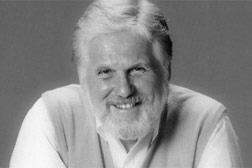A Quote by John Stott
If God speaks to us about himself and his own glorious greatness, we respond by humbling ourselves before him in worship... If He speaks to us about His commandments, we determine to obey them.
Related Quotes
The law of giving and receiving is fundamental, and relates just as much to God as it does to us. As we go through the door of giving ourselves to God in worship we find that God comes through that same door and gives Himself to us. God's insistence that we worship Him is not really a demand at all but an offer-an offer to share Himself with us. When God asks us to worship Him, He is asking us to fulfill the deepest longing in Himself, which is His passionate desire to give Himself to us. It is what Martin Luther called "the joyful exchange."
We can expect God to provide everything necessary to make worship possible. We children of God must ever be dependent upon God, for we have no resources of our own. We are as impoverished in worship times as a baby unable to provide its own bottle at feeding time. God, the object of our worship, also becomes the inspiration of that worship. He has imparted His own Spirit into our hearts to energize that worship. All that is due Him comes from Him. His glorious Person evokes admiration for and honor of Him, as He imparts His nature into me.
There are two gods. The god our teachers teach us about, and the God who teaches us. The god about whom people usually talk, and the God who talks to us. The god we learn to fear, and the God who speaks to us of mercy. The god who is somewhere up on high, and the God who is here in our daily lives. The god who demands punishment, and the God who forgives us our trespasses. The god who threatens us with the torments of Hell, and the God who shows us the true path.
There are two gods. A god who casts us off because of our sins, and a God who calls to us with His love.
He comes to us as One unknown, without a name, as of old, by the lakeside, He came to those men who knew Him not. He speaks to us the same words: "Follow thou me!" and sets us to the tasks which He has to fulfill for our time. He commands. And to those who obey Him, whether they be wise or simple, He will reveal himself in the toils, the conflicts, the sufferings which they shall pass through in His fellowship, and, as an ineffable mystery, they shall learn in their own experience Who He is.
When, in adoration, we look at the consecrated Host, the sign of creation speaks to us. And so, we encounter the greatness of his gift; but we also encounter the Passion, the Cross of Jesus and his Resurrection. Through this gaze of adoration, he draws us toward himself, within his mystery, through which he wants to transform us as he transformed the Host.
At least to look back over their own lives, as I have looked back over mine, for certain themes and patterns and signals that are so easy to miss when you're caught up in the process of living them. If God speaks to us at all other than through such official channels as the Bible and the church, then I think he speaks to us largely through what happens to us, so listen to what has happened to you-for the sound, above all else, of his voice.
It is God who gives us the spirit of worship (Psalm 133:3), and it is what we know of God that produces this spirit of worship. We might say that worship is simply theology, doctrine, what we think about God, going into top gear! Instead of merely thinking about Him, we tell Him, in prayer and praise and song, how great and glorious we believe Him to be!
When one person is struck by the Word, he speaks it to others. God has willed that we should seek and find His living Word in the witness of a brother, in the mouth of man. Therefore, the Christian needs another Christian who speaks God’s Word to him. The Christ in his own heart is weaker than the Christ in the word of his brother; his own heart is uncertain, his brother’s is sure.
When the New Testament speaks about the fullness of grace which we find in Christ, it does not mean only forgiveness, pardon and justification. Christ has done much more for us. He died for us, but he also lived for us. Now he has sent his own Spirit to us so that we might draw on his strength. He grew in grace, and when we draw on his power we shall likewise grow in grace.
Who was this Man of sorrows, acquainted with grief? Who is the King of glory, this Lord of hosts? He is our Master. He is our Savior. He is the Son of God. He is the Author of our Salvation. He beckons, “Follow me.” He instructs, “Go, and do thou likewise.” He pleads, “Keep my commandments.” Let us follow Him. Let us emulate His example. Let us obey His word. By so doing, we give to Him the divine gift of gratitude.
Before His gaze all falsehood melts away. This encounter with Him, as it burns us, transforms and frees us, allowing us to become truly ourselves... His gaze, the touch of His heart heals us through an undeniably painful transformation "as through fire". But it is a blessed pain, in which the holy power of His love sears through us like a flame, enabling us to become totally ourselves and thus totally of God.
Let us serve Him faithfully as our Master. Let us obey Him loyally as our King. Let us study His teachings as our Prophet. Let us work diligently after Him as our Example. Let us look anxiously for Him as our coming redeemer of body as well as soul. But above all let us prize Him as our Sacrifice, and rest our whole weight on His death as atonement for sin. Let His blood be more precious in our eyes every year we live. Whatever else we glory in about Christ, let us glory above all things in His cross.
That we need only to recognize GOD intimately present with us, to address ourselves to Him every moment, that we may beg His assistance for knowing His will in things doubtful, and for rightly performing those which we plainly see He requires of us, offering them to Him before we do them, and giving Him thanks when we have done.
What we see at the cross is the white-hot revelation of the character of God, of his love providing the price that holiness requires. The cross was his means of redeeming lost sinners and reconciling them to himself, but it was also a profound disclosure of his mercy. It is, in Paul’s words, an ‘inexpressible gift’ that leads us to wonder and worship, to praise and adore the God who has given himself to us in this way.

































